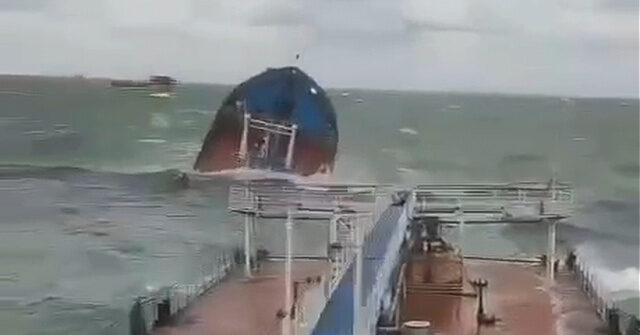We support our Publishers and Content Creators. You can view this story on their website by CLICKING HERE.

Two Russian oil tankers were wrecked in the Kerch Strait over the weekend, coating almost 40 miles of Black Sea coastline in heavy fuel oil.
Several towns along the coast have declared a state of emergency, while a furious Ukrainian President Volodymyr Zelensky accused the Russians of causing an environmental catastrophe by sending two “old, poorly maintained” ships into rough seas.
“These ships were nearly 50 years old. They shouldn’t have been in operation at all, especially in this part of the waters and during this season. Right now, our sea is facing yet another environmental disaster caused by Russia,” Zelensky said on Tuesday.
The two ships in question are 50-year-old tankers called Volgoneft 212 and Volgoneft 239. They were sailing through the Kerch Strait, which separates Russian-occupied Crimea from the Ukrainian mainland, when they ran into 25-foot waves and 45 mile-per-hour winds.
Each ship was loaded with thousands of tons of low-grade heavy oil known as mazut. This type of fuel is rarely used in the West, where it is generally referred to as “waste oil.” Russia and the former Soviet satellite states make much heavier use of mazut in their boilers and furnaces.
The storm in the Kerch Strait ripped Volgoneft 212 in half, leaving the horrified crew to watch as the bow of their ship drifted away. According to the Russian Ministry of Emergency Situations, one member of the crew was killed, two are still missing, and the other 12 have been rescued. Two of the rescued crew members have been hospitalized in serious condition.
Volgoneft 239 ran aground off the village of Taman, Russia at around the same time its sister ship was breaking up. The crew was rescued after weather conditions improved.
Greenpeace Ukraine said on Monday that at least 3,700 tons of oil have spilled from the two ships — an even larger spill than in 2007, when a damaged tanker bathed both sides of the Kerch Strait in oil and caused environmental damage that took years to heal.
“Any oil or petrochemical spill in these waters has the potential to be serious,” Greenpeace Research Laboratories chief Dr. Paul Johnston said on Tuesday.
“It is likely to be driven by prevailing wind and currents, and in the current weather conditions, is likely to be extremely difficult to contain. If it is driven ashore, then it will cause fouling of the shoreline which will be extremely difficult to clean up,” Johnston said.
In the early hours of Wednesday morning, yet another Russian-flagged tanker, the Volgoneft 109, issued a distress call from the Kerch Strait due to a damaged cargo tank. The third ship is also carrying about 4,000 tons of mazut. The Russian Ministry of Emergency Situations insisted the situation aboard the Volgoneft 109 is “not critical.”
Marine scientist Sergey Stranichny told Russia’s state-run Tass news service on Wednesday that copious amounts of oil are continuing to leak from the wreck of Volgoneft 212. Stranichny said the growing oil spill could be clearly seen on satellite images.
Videos posted to social media over the past few days show sea birds struggling to survive as pools of black oil appear on Black Sea beaches. Some of the people posting the videos reported having difficulty breathing from the fumes in the air.
“Anapa is fighting the oil spill, saving beaches – the famous ones with the golden sand, which hundreds of thousands of tourists flock to every year,” Russian Foreign Ministry spokeswoman Maria Zakharova said on Wednesday.
“City authorities are working. The Ministry of Emergency Situations is working. But we can’t do it without the help of volunteers,” she added.
Anapa is a Black Sea resort area famed for its gold-colored beaches. It has been a popular vacation destination for Russians since the Cold War era. Local officials said about four thousand area residents have volunteered to assist with recovery efforts from the oil spill.
Anapa is located in the province of Krasnodar, whose governor, Veniamin Kondratiev, said on Wednesday that cleanup efforts were hindered by continuing bad weather in the Kerch Strait.
“The weather is making the situation more difficult, the storm at sea is not stopping, so it is difficult to predict how long it will take to completely clean up the coast,” Kondratiev said.
Zelensky and other Ukrainian officials blasted Russia for using a fleet of ancient and unreliable ships to provide cheap transportation for dangerous fuel oil.
“This fleet is one of the biggest threats. Putin uses these tankers to finance his war, and most of these vessels are old, poorly maintained, and operate without any oversight,” Zelensky said on Tuesday.
The Ukrainian president urged Western leaders to stop Russia’s “shadow fleet” with sanctions and with “other ways too.”
“There are much larger and more dangerous Russian tankers operating in your seas. This fleet must be stopped. Doing so will not only cut off Russia’s war funding but will also protect nature,” he said.

 Conservative
Conservative  Search
Search Trending
Trending Current News
Current News 







